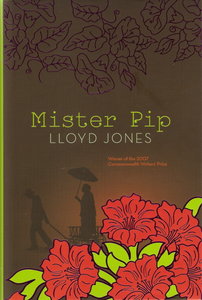Mister Pip
 |
|
| Author | Lloyd Jones |
|---|---|
| Country | New Zealand |
| Genre | Fiction |
|
Publication date
|
2006 |
| Pages | 256 pp (paperback) |
| ISBN | |
Mister Pip (2006) is a novel by Lloyd Jones, a New Zealand author. It is named after the chief character in, and shaped by the plot of, Charles Dickens's novel Great Expectations.
Jones wrote 11 versions of the novel originally setting it on an unnamed Pacific island. The novel was ultimately set against the backdrop of the civil war on Bougainville Island during the early 1990s.
The novel is the story of a girl caught in the throes of war on the island of Bougainville. It is through the guidance of her devoted but strict Christian mother and teacher that Matilda survives but, more importantly, through her connection with Pip, a fictional creation in Charles Dickens' Great Expectations. Pip helps Matilda maintain a desire to live, especially after her mother, the wise Mr Watts, and her island home cease to exist.
The novel opens with a colourful description of Watts, whom the children call Pop-Eye (The first line of the book being: 'Everyone called him Pop Eye') due to his eyes that "stuck out further than anyone else's". We learn of his marriage to Grace, a native of Bougainville, which explains why he remained long after most white men had abandoned the island. With military tension rising and the school room growing over with creepers, Watts decides to take on the task of educating the children. Despite his claim to be limited in intelligence, he introduces the students to one of the greatest English authors, Charles Dickens.
Dolores, Matilda's overzealous Christian mother, expresses an extreme distrust of the teacher and his curriculum. She does everything in her power to ensure that her daughter's mind is not polluted by the strange white man, including making weekly visits to the classroom. She even goes as far as stealing and hiding Watts's Great Expectations book, an action that causes immense trouble when soldiers enter the village and find Pip's name carved into the sand. It is Matilda who wrote his name, and it is her guilt that makes her empathize with her mother, who refuses to give up the book as evidence that Pip is not a rebel but a fictional character. Convinced that Pip must be a spy who has been hidden from them, the soldiers destroy the houses. All they leave behind are smoking fragments of the village's former life.
As the tension escalates, a group of rebel soldiers returns to the village to question Watts. He agrees to explain himself over the course of seven nights, and proceeds to tell a story that entwines Pip's life with his own. Matilda develops an idea about why he returned to the island with his wife and stayed after all the other whites left. His wife has died, and Watts considers moving on and offers Matilda a chance to escape from the island. However, she would have to choose between Watts and her mother but before this can happen the rebels flee and the soldiers return.
...
Wikipedia
